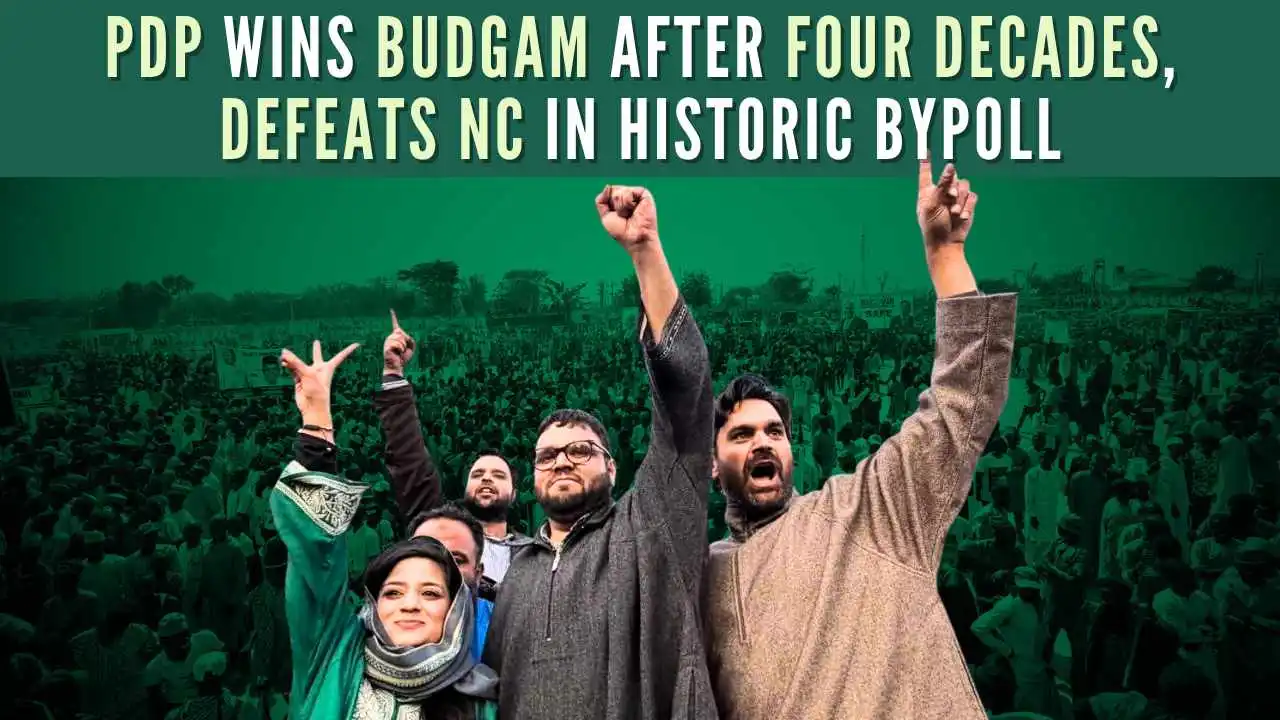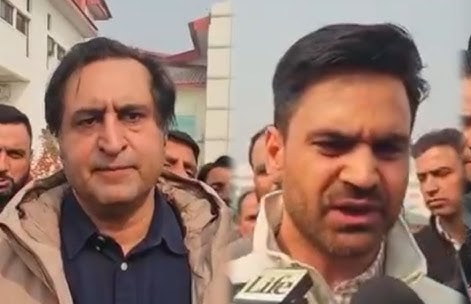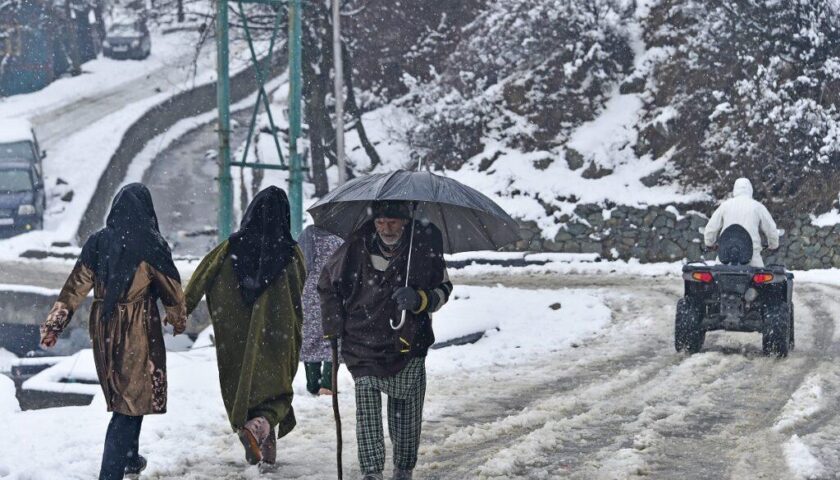Budgam Bypoll Fallout: Omar Blames Ruhullah for NC’s Defeat
By: Javid Amin | 15 November 2025
In a political earthquake reverberating through central Kashmir, the People’s Democratic Party (PDP) has achieved a historic breakthrough by winning the Budgam Assembly bypoll, a constituency long considered a stronghold of the National Conference (NC). Aga Syed Muntazir Mehdi of PDP defeated NC’s Aga Syed Mehmood Al-Mosavi by a margin of 4,478 votes, according to the Election Commission.
This victory is more than just a change in representation—it represents a significant challenge to the NC government led by Omar Abdullah, reflecting both deep-rooted local disenchantment and wider political undercurrents in Jammu & Kashmir.
In this detailed article, we unpack the context, ground realities, political dynamics, and potential ramifications of this by-election. Drawing from verified sources and expert analysis, we explore how this win signals not only a revival for the PDP, but also a warning for the NC as internal fissures grow more visible.
The Context: Why Budgam Was a High-Stakes Bypoll
01. Budgam: An NC Citadel
Budgam has historically been near-sacrosanct territory for the National Conference. For decades, NC—and especially the Aga family—has held sway over this constituency. The Tribune The seat vacated by Omar Abdullah himself added symbolic weight: he had contested and won both Ganderbal and Budgam in the 2024 Assembly elections but chose to retain Ganderbal, leaving Budgam open.
The bypoll was thus more than a routine election—it was being treated as a litmus test for Omar Abdullah’s one-year-old government. The New Indian Express+1 Critics and opposition voices framed it as a referendum on the NC’s governance, performance, and delivery of promises made during the previous election cycle.
02. Anti-Incumbency and Unmet Promises
The campaign leading up to the poll was steeped in anti-incumbency rhetoric. According to reports, residents of Budgam expressed strong dissatisfaction with unfulfilled promises: job creation, 200 free electricity units, 12 subsidized LPG cylinders, and a fair reservation policy were among the pledges highlighted by the opposition.
PDP leaders framed their victory not merely as a political gain, but as a message. According to them, the electorate was sending a warning: a mandate can be reversed if promises are not honored.
The Election: Key Results & Voter Behavior
01. The Numbers That Mattered
-
Winner: Aga Syed Muntazir Mehdi (PDP) – 21,576 votes.
-
Runner-up: Aga Syed Mehmood Al-Mosavi (NC) – 17,098 votes.
-
Margin of Victory: 4,478 votes.
-
Turnout: Approximately 50% of the ~1.26 lakh electorate voted.
-
Other notable contenders: Seventeen candidates contested; independent Jibran Dar came third, securing around 7,152 votes (~11%).
02. What the Voters Said: Protest and Accountability
For many voters, the bypoll result was a clear act of protest. Local residents quoted in media coverage said their votes were meant to register displeasure with the NC’s neglect and unmet promises.
One voter, Ghulam Nabi, expressed this sentiment sharply: “Omar Abdullah had said during the 2024 campaign that he would retain the seat he wins with a bigger margin. He won from Budgam but betrayed us.”
Another lamented NC’s attitude toward Aga Ruhullah Mehdi, the influential Shia MP, describing NC’s treatment of him as an “insult.”
The “Ruhullah Factor”: Absence & Alienation
One of the more significant undercurrents of this election was the absence of NC MP Aga Syed Ruhullah Mehdi from the campaign trail. Ruhullah, a three-time representative from Budgam, had become a vocal critic within his own party. He declined to campaign for the NC candidate, reportedly due to deep ideological and personal differences with Omar Abdullah’s leadership.
Political observers and local voters linked this absence directly to the NC’s poor performance. Ruhullah’s support base, especially among Shia voters, is substantial in Budgam; many believe his distance split the traditional NC vote, fragmenting what was once a solid NC bloc.
After the result was declared, Ruhullah himself posted a message on social media quoting the Quran: “Arrogance is the recipe for disaster. Consciousness, humility and introspection is the way.” The Tribune His words underscored both a moral rebuke and a political statement.
Political Players & Dynamics
01. PDP: Resurgence and Strategy
1.1 Muntazir Mehdi’s Win: Symbolism & Momentum
PDP’s Aga Syed Muntazir Mehdi’s victory is historic: it’s the first time PDP has won Budgam. kashmirage.net This marks a major comeback for a party that had just three seats in the last assembly but now adds a fourth.
PDP leaders framed this win as a people-driven verdict—a direct rebuke to NC and a call for accountability. Muntazir himself said the outcome was “a protest against the NC for not fulfilling its political and developmental promises.”
1.2 Internal Messaging: Work, Not Just Symbolism
PDP’s corner interpreted the result as not just symbolic but practical: they need to demonstrate they are capable of governance, not just opposition. The party hopes to leverage this momentum ahead of future elections, underlining development, responsiveness, and ground-level engagement.
02. National Conference: Internal Strain and Accountability Crisis
2.1 Omar Abdullah Under Fire
For NC and Omar Abdullah personally, the loss is a serious blow. Abdullah had directly contested from Budgam in 2024, won, and then vacated the seat—an action that now looks politically costly.
In the wake of the defeat, he publicly criticized MP Ruhullah’s abstention from the campaign. He labelled it “political suicide,” accusing Ruhullah of cutting his nose to spite his face.
2.2 The Ruhullah Rift: More Than Just Elections
The larger issue is not just the bypoll, but a deepening internal fissure. Ruhullah is not just any party member—he’s from an influential political family, enjoys strong local support, and is rooted in Budgam’s Shia community. His distancing from the party is more than symbolic; it reflects ideological and operational disagreements with Omar Abdullah’s leadership.
Analysts interpret Ruhullah’s absence as a sign that NC’s leadership may be underestimating internal dissent. The Budgam defeat is likely to become a catalyst for internal review—or worse, further fragmentation.
Ground Realities: Shia Demographics, Governance Lapses, and Voter Sentiment
01. Demographic Dynamics: The Shia Vote
Budgam’s electorate is significantly shaped by its Shia population, making sectarian dynamics and local leadership critical in any contest.
Ruhullah’s influence among Shias has long been a factor in NC’s electoral strategy. His absence likely dampened NC’s ability to consolidate this key voter base. Meanwhile, PDP’s Muntazir, himself a Shia leader, may have benefited from both his identity and his ability to project change and accountability.
02. Governance Gaps: What Voters Felt Was Missing
Citizens voiced frustration at what many perceived as neglect—especially after Omar Abdullah vacated Budgam post-election. According to local voters, NC’s presence on the ground dwindled after 2024, and promises made during the campaign remained largely unfulfilled.
Some key areas of grievance included:
-
Electricity: The unfulfilled promise of 200 free units.
-
Fuel: Pledges around subsidized LPG cylinders.
-
Jobs and Reservation: Commitments on employment and fair reservation policies.
-
Representation: A feeling that Budgam had been neglected politically after Abdullah vacated the seat.
These gaps helped the opposition narrative gain traction.
03. Protest Voting and Political Messaging
This bypoll was not just about electing a representative—it was a statement. Many voters treated their ballot as a means to signal dissatisfaction.
As Muntazir put it, this verdict “will force the NC to fulfil the promises it made to the people of J-K.” PDP’s Iltija Mufti echoed this, calling it “the people’s victory” and underlining that what was lost was trust, not just a seat.
Professor Noor Baba, a Srinagar-based academic, remarked that the result reflects “growing public dissatisfaction with the ruling party.”
Political Ramifications & Future Scenarios
01. For the NC Government: A Warning Shot
This defeat is likely to trigger assertive introspection within the NC:
-
Leadership book-keeping: Questions will arise about Omar Abdullah’s decision to vacate Budgam and how much that alienated his base.
-
Internal reconciliation: Pressure may build to bridge the gap with Ruhullah and other dissenting leaders.
-
Governance recalibration: The NC might need to double down on delivering its unfulfilled promises—or risk further erosion.
02. For the PDP: Momentum & Opportunity
For the PDP, this is not just a win—it could be the start of a larger resurgence:
-
Legislative strength: With this seat, PDP’s foothold in the J&K Assembly strengthens.
-
Narrative of change: The party can now credibly pitch itself as a government-in-waiting, especially in central Kashmir.
-
Electoral leverage: This result gives PDP momentum ahead of future state-level contests, enabling it to attract more support and possibly coalition partners.
03. Broader Political Implications in J&K
-
Factional realignments: The NC’s internal fissures may lead to realignment, new alliances, or even new political formations.
-
Voter empowerment: This election could embolden voters across J&K to leverage bypolls as mechanisms for accountability, not merely as local contests.
-
Shia leadership’s role: The importance of leaders like Ruhullah Mehdi in mobilizing identity-based votes gains fresh visibility, reaffirming sectarian undercurrents in J&K politics.
Lessons & Takeaways
-
Even bastions fall: No seat is invulnerable if governance falters and internal dissent festers.
-
Representation matters: Constituents value not just electoral victory, but ongoing engagement, presence, and delivery.
-
Internal cohesion is vital: Factional bitterness can undermine even well-organized parties.
-
Protest votes can reshape politics: By-elections are increasingly becoming platforms for expressing discontent with ruling parties.
-
Identity, when aligned with performance, can be potent: In Budgam, Shia identity coupled with governance issues proved a potent combination for PDP.
Challenges & Caveats
-
While the bypoll is significant, it’s only one seat; turning this into a broader political shift requires sustained effort.
-
Expect overcorrection: Both PDP and NC may overreact—PDP to capitalize, NC to recover. Such swings can lead to missteps.
-
Governance will be under the lens: Winning is one thing; delivering now becomes crucial. If PDP fails to meet local expectations, the moment could be short-lived.
-
Factional dynamics may intensify: With Ruhullah’s voice strengthened, internal NC politics may get more turbulent.
Bottom-Line
The Budgam bypoll result is a landmark in Jammu & Kashmir’s political landscape. It is not merely a numerical shift on the electoral map—it’s a symbol of change, dissent, and regained agency. The People’s Democratic Party, once marginalized, has broken new ground. The National Conference, on the other hand, must confront the internal and external challenges that this loss has laid bare.
For the people of Budgam—and perhaps for broader J&K—the message is clear: political loyalty is not permanent, and governance without accountability has real costs. As both parties recalibrate, one thing is certain: the next chapter in J&K politics promises to be more contested, more introspective, and more consequential.




